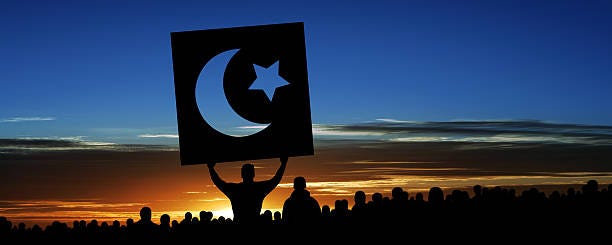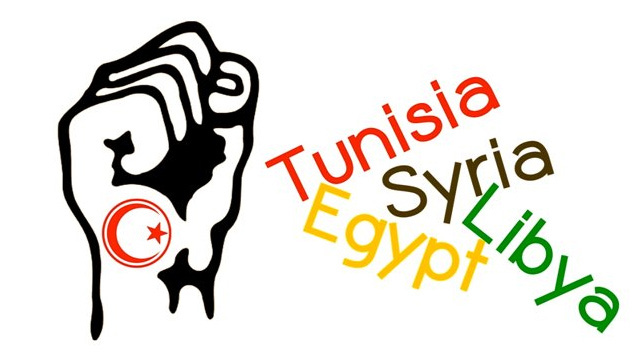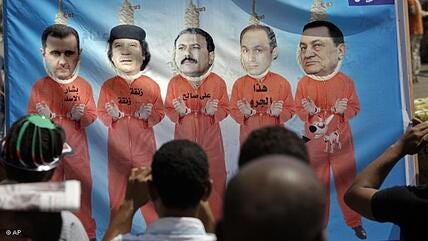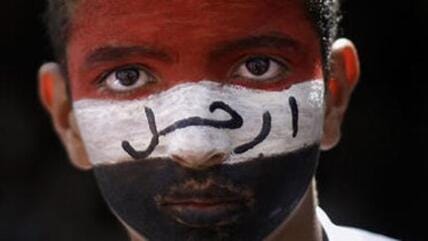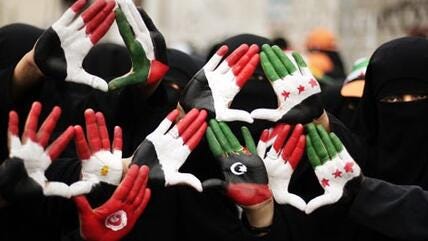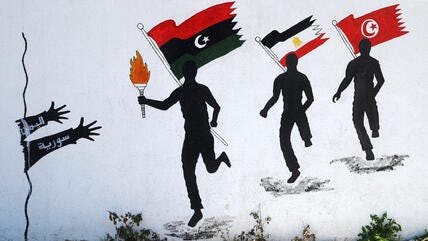#018. There is No Arab Spring, only a Miseducation of its Winter Solstice.
sometimes we misname a thing to mask its impact
On the 17th of December, 2010, the air in Sidi Bouzid, Tunisia, was not filled with the fragrance of spring, but with the scent of burning flesh.
Mohamed Bouazizi—a 26-year-old fruit vendor, humiliated, slapped, and seized by municipal officers—poured petrol on his own body and lit a match. And from his body, a spark came alive. The Western media analyzed this with the events that follow, and named it the Arab Spring.
What kind of spring begins with smoke and ash?
Here's what you'll read:
The miseducation
Un-education
Re-education
The Spring is yet to Come
Revelations
• The miseducation
The term Arab Spring carries with it the gentle hope of rebirth. Spring is a season when flowers return, when farmers sow with confidence, when lovers meet under newly leafed trees. Spring is an invitation to live again.
But this was not that in the Arab nations.
What happened across North Africa and the Middle East in the wake of Bouazizi’s death was less of a blooming and more of a bursting. Protest after protest erupted. Tunisia bled into Egypt, into Libya, into Syria, into Yemen, into Bahrain.
Agitation was fueled, and the world applauded the people's audacity, boldness, and confidence from afar while the region cracked apart. People were made to do beyond their call for change, but to oust the tenure of their leaders, and sometimes get them killed.
Gaddafi's leadership was tagged Neocolonialism. Yet, after falling him, the promised democracy did not rise. Instead, what they experience, just like other Arab nations, were power vacuums, civil wars, foreign interventions—which eventually became systemic re-colonization.
The Western narrative painted pictures of youthful resistance, social media revolutionaries, and liberal awakenings. There were stories of hope, and yes, hope did rise. But it was quickly trampled by tanks and drone strikes.
• Un-education
Who benefits from this “Spring”?
The people at the centre, or on the hotspot of this Spring traded one tyranny for another. Or worse, for statelessness. In Libya, a country once whole is now a map torn into factions. In Syria, the scent of spring has long been drowned by the chemicals of war. In Egypt, what started as jubilation turned into yet another regime.
But the orchestrators, or sponsors?
They got spectacle.
As in, the West gained spectacle. Oil prices fluctuated. Arms deals rose, and Refugees crossed oceans. I will give a brief explanation of these below:
The West, primarily the United States, European nations and their allies gained spectacles by turning the Arab uprise into a media-driven narrative to serve their economic, political and strategics interest; to justify their intervention and mask their self-interest.
Western media outlets, such as CNN, and BBC provided wall-to-wall coverage of protests across the Arab Spring nations. Images of protesters are framed as icons of democratic triumph.
Western leaders used their media opportunity to amplify their own images as champions of democracy, and moral leaders; despite selective engagement. U.S was seen financing Egypt's protest and abandoning Bahrain's. They obviously prioritized strategic goals over human welfare.
They shift focus to foreign policy triumphs and distract the world from their domestic challenges, such as the lingering effects of the 2008 financial crisis, 9% of unemployment in the U.S. in 2011, and austerity measures in Europe.
Oil production in countries like Libya was disrupted, leading to price volatility. Brent crude oil prices peaked at $126 per barrel in April 2011, up from $80 in 2010, benefiting Western oil companies like ExxonMobil and BP.
The Stockholm International Peace Research Institute (SIPRI) reported a surge in arms imports to the Middle East post-2011. The U.S. arms sales to Saudi Arabia reached $90 billion between 2010 and 2015, partly to counterbalance Iran’s influence amid regional chaos. Western defense contractors, like Lockheed Martin and BAE Systems, profited significantly.
The fall of Libya’s Muammar Gaddafi and the weakening of Syria’s Bashar al-Assad aligned with U.S. and NATO strategic goals. NATO’s 2011 intervention in Libya secured Western influence over Libya’s oil and reduced a regional wildcard; which came at the cost of Libya’s stability.
Western organizations like NED and USAID expanded their influence by funding civil society groups and democracy promotion programs. NED’s budget for Middle East programs increased post-2011, with $2.3 million allocated to Egyptian NGOs in 2012 alone. This reinforced Western soft power under the guise of supporting democracy.
•Re-education
To call a thing by another name is sometimes to bury its true form beneath metaphor. Sometimes we misname a thing to mask its impact.
Language is not neutral. It does not merely reflect, it reshapes. It is easier to speak of a “Spring” than to own up to a destabilisation with global fingerprints.
The term's true form reflects a Western bias expecting Middle Eastern societies to emulate European democratic transitions. This bias ignores the region’s unique historical and cultural contexts and the diversity of demands across countries.
When actions give birth to year-long unrest, how do we call that a "Spring" and not "Winter", especially when the chilling effects is still strong more than a decade later.
Syria’s civil war has resulted in over 380,000 deaths and displaced more than half the population, while Libya remains divided between rival administrations. Does this not align better with the "Winter" postulation?
In fact, Spring's seasonal metaphor only suggests a temporary hopeful phase, which contrasts sharply with the prolonged violence and authoritarian resurgence in many countries.
• The Spring is yet to Come
We need no prophet to tell us it's not spring yet in the Arab nations.
The region bleeds every now and then.
But it will come.
—Empty prospect and promise
In the guise of getting a democratic government that promised freedom of expression, employment and economic growth, people are inspired and empowered and instigated to trump their country's leadership.
—What did the people really want?
What they wanted was freedom of speech, expression, absence of censorship—especially as it relates to internet usage, and employment.
Are there demand right? Yes.
The demands were very very relevant.
—But what did they get?
Have these been achieved 15 years later?
According to a Council on Foreign Relation's article, In no country has the standard of living significantly improved since the revolutions, and it has even declined in conflict-ravaged areas.
https://www.cfr.org/article/arab-spring-ten-years-whats-legacy-uprisings
The power vacuums created by the Arab Spring allowed extremist groups to thrive.
ISIS emerged in Syria and Iraq, capturing territory and resources, including oil fields, by 2014.
The chaos in Libya also enabled Al-Qaeda affiliates to gain footholds, profiting from arms smuggling and instability.
In countries like Libya and Yemen, local militias and warlords gained power by controlling resources and territories. For example, Libya’s rival factions profited from oil smuggling and human trafficking, exploiting the lack of central governance.
• Revelations
Harun Yahya's "The Winter of Islam and the Spring to Come," inspired this viewpoint.
However, it did not inspire the discussion—it's been 10 years that I got the book, but haven't read it.
As such, this is not even a religious discourse, it's a call for international humanitarian law respect. To call for the respect for individual country's sovereignty, against the West's imposed supremacy over other countries and international laws.
While I encourage patience, let's not enjoin passivity. This is a long, painful gestation of change, a season of darkness where light is gestating, and not extinguished.
As the Sufi saying goes: the rose does not complain of the thorn; it knows the pain is part of the bloom.
This is not the Spring, it is a Winter, but the Spring is coming.
What this discussion seeks to further reveal:
The chaos in the North Africa and Middle East has external, Western influence;
The danger of Western media and how it uses language to manipulates truth;
There is need to unlearn these propaganda and reclaim our narratives, because it could be us next—West Africans or even Nigerians;
Know that naming is framing, and framing is power.
So I say again:
There is no Arab Spring;
There is a fire that has not gone out;
There is a struggle that is not yet done;
There is a people misunderstood, misrepresented, misnamed, and miseducated;
There is a silence—heavy, intentional—around the consequences of that misnaming.
Let us not lie with words. Let us not mistake ash for bloom. A name carries one’s destiny. And he who misnames, misleads.
Call it what it is. And maybe, from that honest naming, a true spring may yet come.
From the perspective of this discourse, you should now understand the real intent behind the Israel-Iran war, Israel-Palestine war, Israel-Lebanon attack, Russia-Ukrain war, and the role played by countries like US and Saudi in these unrest.
What's your view about all of these?
Let's discuss in the comment.
Odàbọ̀. Kó si àdìtú tí a kì í tú.
Farewell. May no mystery remain unsolved.




